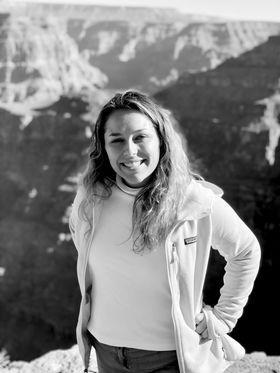
Sabrina Sherman is a 2016 cum laude graduate of Southern Oregon University with a BA in English. A native of Grants Pass, she is completing a PhD in English at the University of Oregon, where she teaches college composition.
Ed Battistella: What has your graduate school experience been like so far?
Sabrina Sherman: It has been challenging, but most of my challenges are outside of coursework and academics. It’s important to recognize the toll it takes on a person’s finances to be in school for so long; alongside the financial sacrifice is the sheer amount of time spent enduring academic gatekeeping. On that note, I should point out that most of my graduate school experience has consisted of heaps of imposter syndrome in which I constantly question if I deserve to be in a program that has awarded me a six year tuition waver, a stable income, and many other career opportunities. So, obviously, someone thinks I deserve to be here.
EB: What’s been your focus as a scholar?
SS: I am an African Americanist with a focus in theories of passing, mixed race identities, and black feminisms. I am particularly interested in early 20th century US ideas about colorism and its role in mixed race or white passing women. The texts I look at mostly deal with black women who pass for white or are mixed race. The time period I focus on is 20th century, mostly, or the Harlem Renaissance to present. So, I am looking at the narrative echoes of Nella Larsen’s novella Passing.
EB: What sorts of things are you reading and writing about?
SS: Well, I started my grad school career reading lots of post-structuralist theory such as Foucault and Derrida. Now that I’m getting more specialized, I’ve moved into reading Black Feminist theorists and writers such as Morrison, Walker, Spillers, Davis, and Christian, to name a few. I’m in my final year of coursework and my third year of a six-year PhD program. I am currently (in fall 2020) taking a class/seminar on nonfiction comics (which is totally out of my wheelhouse) and I am working on revising a term paper into an article for a publication course. I am also teaching a first-year writing composition course, and I do the readings I assign for my students. I write stuff for my classes, both as a student and instructor. So, lots of writing, always!
EB: What has been the most interesting aspect so far?
SS: Interesting for me is such a loaded term, but then again I learned to question the word “interesting” in a seminar. Go figure. So, I find it interesting (and frustrating) how what I consume on a cultural level—so, Netflix shows, memes, Instagram posts, YouTube videos, etc.—gets circulated into my academic life as relevant material. Everything you do seems to matter, but that also means that it can be hard to compartmentalize personal and academic/work lives. I tend to establish boundaries in good faith and spend a good amount of time trying to enforce “fun” time that is purely inconsequential to my graduate work.
EB: Has graduate school changed you?
SS: Yes, beyond what I can see or notice right now. It has changed everything for me. I can’t emphasize enough how much “grad school” sort of attempts to consume your entire identity such that you often refer to yourself as “just a grad student.” But, actually, grad school just emphasizes the ways in which you can ask better, more specific, and consequential questions. Maybe I’m oversimplifying that idea, but I’m sticking with it. Also, I’m convinced that grad school makes you second guess everything.
EB: Not to be nosy, but what’s are your long-range plans?
SS: I’m assuming you’re referring to my career goals. If so, to answer your question, I will attempt to apply for and attain a tenure track position somewhere. I plan to finish my PhD in the allotted time of six years from entering my program at UO. So, hopefully, by 2023, I’ll be able to call myself a PhD holder. At that point, I will try to get a job to whatever extent that is possible in whatever way that is the most mentally and financially viable. In other words, I don’t want to take a job (mostly, I’m thinking adjunct professorships) that requires me to teach 5-6 sections of 30 students per section and in which I am barely scraping by. Being a professor isn’t that important to me; however, mental, physical, emotional, and financial stability, are.
EB: Do you have any advice for undergraduate students considering going on for more schooling?
SS: My biggest piece of advice is to take a gap year between undergrad and grad school. Especially if you’re considering applying for a PhD program like I did, take a long, hard look at why you want to go to grad school and what you think it’ll offer you. I have never regretted my decision to wait to apply to graduate schools after a gap year. Especially if you’re a Writing or English major, it might be intimidating to take a break from writing, and you might worry that you’ll lose those skills. I’m convinced that life experience guides a more focused statement of purpose and that is precisely what application committees love to see. They want to know why you want to be in their graduate program, which for me took a year or so to figure out.
EB: Thanks for talking with us!
SS: No problem. I am proud to represent Southern Oregon University, and I am grateful for my experiences there. Seriously. I don’t know how I could’ve done grad school well without SOU English instructors’ teaching me the foundational strategies that I still use today! So thank YOU!

 Follow
Follow